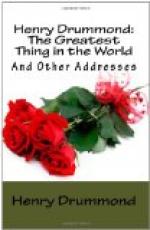Yet this is only half the truth. Christ’s life outwardly was one of the most troubled lives that was ever lived: tempest and tumult, tumult and tempest, the waves breaking over it all the time till the worn body was laid in the grave. But the inner life was a sea of glass. The great calm was always there. At any moment you might have gone to Him and found Rest. Even when the blood-hounds were dogging Him in the streets of Jerusalem, He turned to His disciples and offered them, as a last legacy, “My peace.” Nothing ever for a moment broke the serenity of Christ’s life on earth. Misfortune could not reach Him; He had no fortune. Food, raiment, money—fountain-heads of half the world’s weariness—He simply did not care for; they played no part in His life; He “took no thought” for them. It was impossible to affect Him by lowering His reputation. He had already made Himself of no reputation. He was dumb before insult. When he was reviled, He reviled not again. In fact, there was
NOTHING THAT THE WORLD COULD DO TO HIM
that could ruffle the surface of His spirit.
Such living, as mere living, is altogether unique. It is only when we see what it was in Him that we can know what the word Rest means. It lies not in emotions, or in the absence of emotions. It is not a hallowed feeling that comes over us in church. It is not something that the preacher has in his voice. It is not in nature, or in poetry, or in music—though in all these there is soothing. It is the mind at leisure from itself. It is the perfect poise of the soul; the absolute adjustment of the inward man to the stress of all outward things; the preparedness against every emergency; the stability of assured convictions; the eternal calm of an invulnerable faith; the repose of a heart set deep in God. It is the mood of the man who says, with Browning, “God’s in His Heaven, all’s well with the world.”
Two painters each painted a picture to illustrate his conception of rest. The first chose for his scene a still, lone lake among the far-off mountains. The second threw on his canvas a thundering waterfall, with a fragile birch-tree bending over the foam; at the fork of a branch, almost wet with the cataract’s spray, a robin sat on its nest. The first was only Stagnation; the last was Rest. For in Rest there are always two elements—tranquillity and energy; silence and turbulence; creation and destruction; fearlessness and fearfulness. This it was in Christ.
It is quite plain from all this that whatever else He claimed to be or to do, He at least
KNEW HOW TO LIVE.
All this is the perfection of living, of living in the mere sense of passing through the world in the best way. Hence His anxiety to communicate His idea of life to others. He came, He said, to give men life, true life, a more abundant life than they were living; “the life,” as the fine phase in the Revised Version has it, “that is life indeed.” This is what He Himself possessed, and it was this which He offers to mankind. And hence His direct appeal for all to come to Him who had not made much of life, who were weary and heavy-laden. These He would teach His secret. They, also, should know “the life that is life indeed.”




